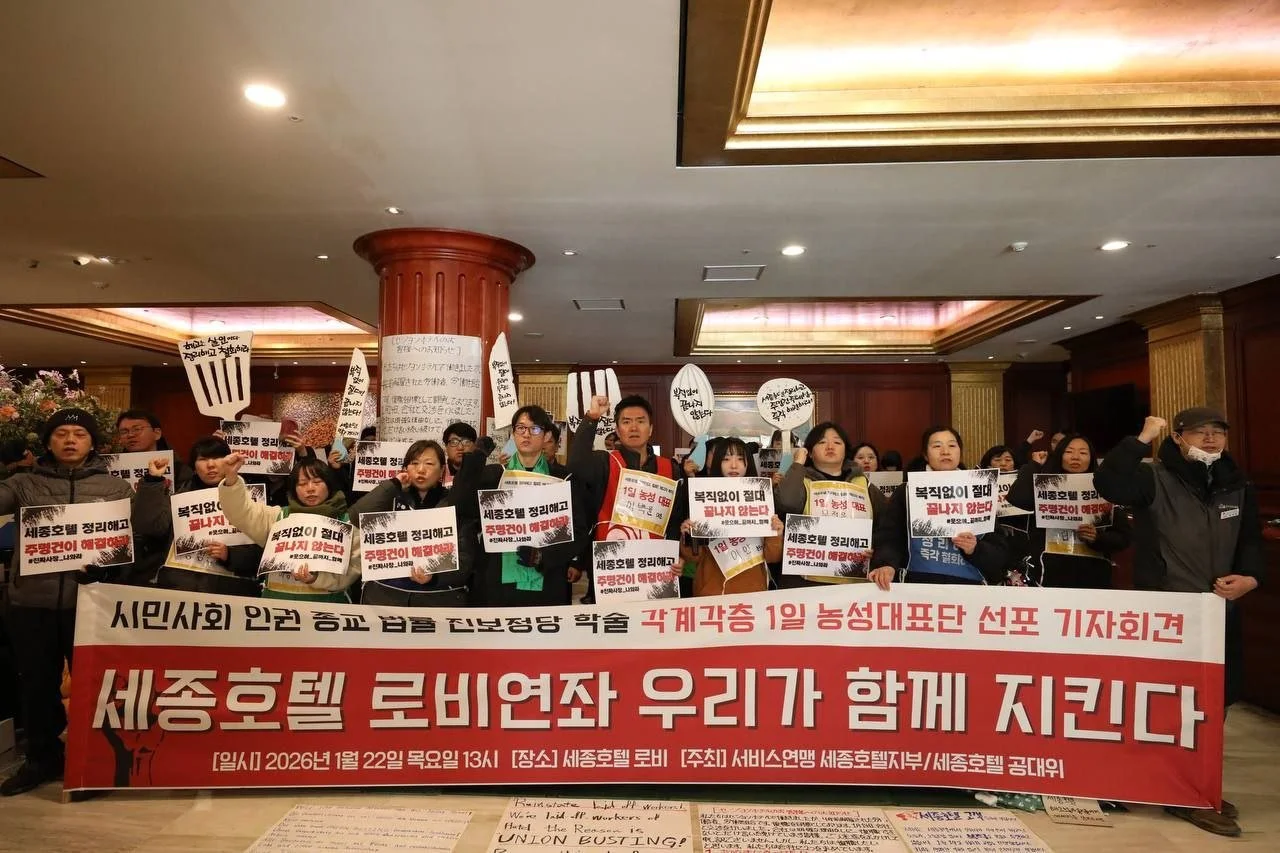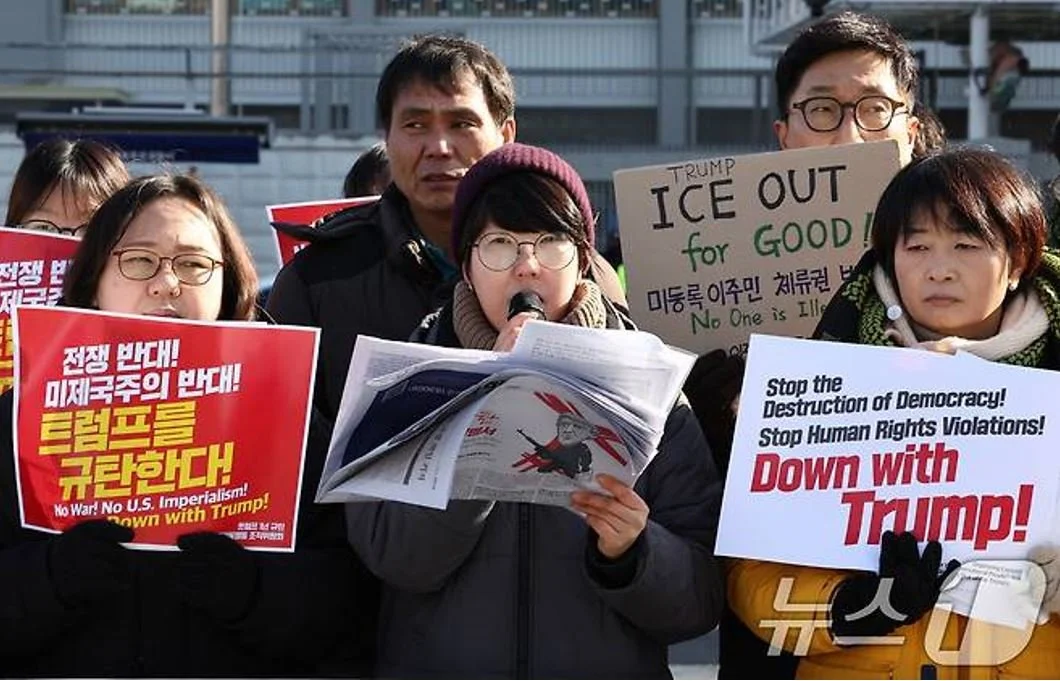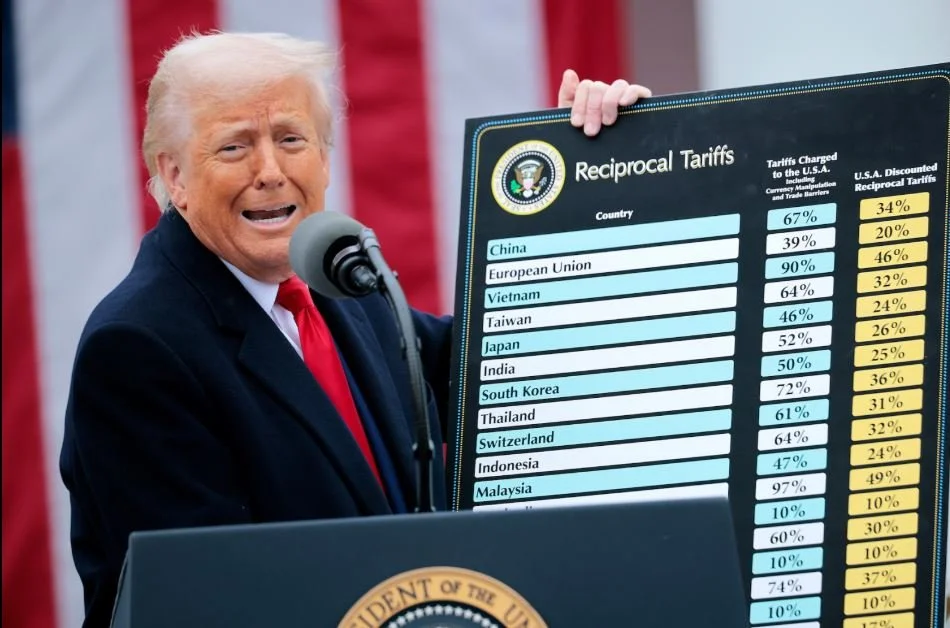[Statement] Solidarity with Venezuela and Cuba!
Now is the time to stand firmly with Venezuelans, Cubans, and all those opposing US hyperimperialism. We cannot lament our losses on the sidelines. We must rage against the US war machine to prevent temporary retreats from becoming permanent defeats. If US imperialism wins, we not only lose national sovereignty, self-determination, and democracy, we also endanger humanity and posterity.
The only unusual and extraordinary threat to humanity is the United States and its willingness to burn down the planet and risk nuclear holocaust to continue dominating the world.
Read More
Press Conference Announcing the One-Day Sit-In Delegation from Various Sectors at the Sejong Hotel Lobby
Last October and early November, we organized protests in Seoul and Gyeongju together with Korean organizations and ten international speakers to oppose APEC — a forum serving only the interests of capital and powerful nations. Those ten international speakers visited this very place, in front of the Sejong Hotel, to meet Comrade Go Jinsu during his high-altitude protest. When we later asked them what moment in Korea had left the deepest impression, they answered that it was their time here — meeting Comrade Go Jinsu, the trade union activists fighting in solidarity, civic group activists, and people standing together in struggle.
Read More
Press Conference for the International People’s Action Denouncing One Year of the Trump Regime
After the first year of the Trump regime, we have gathered here today to place Trump in the International People’s Court as the accused. This is a space to expose, denounce, and judge the crimes of Trump, the Trump administration, and U.S. imperialism — crimes that include the destruction of democracy, violations of human rights, the waging of wars, complicity in genocide, and the infringement upon the sovereignty of nations — all through the power of the world’s peoples.
Read More
How South Korea’s Billions Will Upgrade Trump’s War Machine
While Trump has managed to extract many concessions through his tariff war, the memorandum of understandings (MOUs) that are reached are not set in stone. Not only are the legality of Trump’s tariffs (the extortion mechanism) being deliberated upon by the Supreme Court, the MOUs are not legally binding. In other words, their enforceability will be determined by a struggle between Trump’s tariff pressure and a government—and more importantly, its people’s—willingness to resist Trump’s extortion and war machine.
Read More
Understanding APEC: Towards a Multipolar World
This is the 3rd article in a series exploring APEC within the current political conjuncture. If the previous articles covered “What is APEC?” and “The Making of Global Value Chains,” this article explores the seismic shifts in the unipolar order towards a multipolar one.
If Trump’s tariff war can be interpreted as the U.S. flexing its economic power, it can also be seen as a tacit acknowledgment of the global shift towards a multipolar world: the vision of US hegemony is no longer expansive and global but is shrinking into entrenched interests and spheres of influence more suitable for dealing with a multipolar order. Yet, if Trump is accelerating this shift, he is neither the one who started it nor the only one to contribute to it.
Read More
Understanding APEC: The Making of Global Value Chains
To understand our current political conjuncture involves understanding the neoliberalist trajectory that nurtured global value chains and how it triggered the current backlash culminating in Trump’s tariff extortion. Contrary to the claims of its proponents, neoliberal globalization was never about free markets. It always involved state intervention on behalf of corporations and investors. Through the IMF, WTO, and World Bank, the US-led global north empowered multinational corporations to exploit workers and resources in the global south by shielding them from democratic control, while dismantling the post-World War II social welfare gains within its own borders.
Read More
Understanding APEC: What is APEC?
If you look at the news, the media treats the Asia Pacific Economic Cooperation (APEC) Forum more like a gala than a policy forum about regional economic policies. Despite high level meetings having occurred between the government and business interests (i.e., the APEC Business Advisory Committee), despite two senior official meetings having taken place, the media has done a negligible job of bringing the agenda and discussions in these meetings to public consciousness or debate. Instead, it has mostly focused on who will be there — K-pop megastar G-Dragon was named APEC Ambassador — or whether the accommodations and infrastructure are adequate. Little is mentioned about the specifics of the mostly closed-door discussions and decisions in the meetings and gatherings that will continue to take place between government ministers, experts, and corporations all the way up to the Leaders’ Summit on 30 October to 1 November in Gyeongju.
Read More
The US Makes Most Compelling Case for Nuclear Proliferation
The US Makes Most Compelling Case for Nuclear ProliferationThe atomic bomb has been humanity’s most dangerous creation; that the United States government used the atom bomb twice against Japan’s civilians in August 1945 can neither be forgiven nor forgotten. It is fitting that one of the first acts of the United Nations in January 1946 was establishing a commission to deal with the ‘Problems Raised by the Discovery of Atomic Energy’. Yet, the resolution did not ban atomic weapons but simply sought to study its ‘problems’. Even after the grotesque demonstration in Hiroshima and Nagasaki, the United States government was reluctant to permit the abolition of nuclear bombs. Having opened the doorway to Hell, there was no real desire to close it.
Read More
President Lee Jae-myung Shouldn’t Attend NATO: Amidst Crises, Peace is Pragmatic
Given the increasing pressure to attend NATO, it’s likely Lee will attend. Lee’s initial reasoning that now is the time to focus on the recovery of Korea’s economy rather than on attending the NATO summit is pragmatic for Koreans. As a way of stepping out of the US led war drive in the region when we should be diffusing rather than exacerbating the world’s crises, it is also pragmatic for the world.
Read More
Trump’s Tariff Extortion: A Primer
Are Trump’s policies simply US protectionism to re-industrialize? If they are imperialist—burdening US consumers with tariffs and stunting the rising economies of developing countries and others—then should we be calling for their repeal and a return to the previous (neoliberal) global trading system? To understand Trump’s protectionism and how progressives/leftists should respond requires exploring why and how the United States created economic globalization and conceptualize the elements for our alternatives and concrete demands to get there.
Read More
US recruits South Korea to help colonize and militarize space
If the conference launched the fight against the Yoon administration’s militarization of space, it also remained connected to frontline struggles against militarization in South Korea, the United States’s first line of attack against China. In particular, presenters spoke about the construction of airports with dual military functions. Kim Yeon-tae president of the People’s Action to Nullify The New Saemangeum Airport, noted the absurdity of spending over 40 trillion won ($30 billion) to build 10 more airports in an area as small as South Korea, where 11 out of 15 airports are running at a loss. Constructing new airports only made sense when taking into account their dual military use. More specifically, Saemangeum International Airport—right across from China and connected to the US Kunsan Air Force Base—would allow the Air Force Base to launch more jets. Soon-ae Kim, chair of the Operating Committee of Jeju’s Green Party, explained how building a second airport on the island as well as prospects of its military use violate Jeju’s official designation as an island of peace.
Conference speakers and attendees made clear that their movement was rooted in frontline struggles against profiteering from human and environmental destruction and that it would continue. Yong-woon Hwang, a journalist and activist against the Jeju Naval Base, proposed building public awareness around AI and the militarization of space through the annual Whistler Film Festival. Ultimately, the activists gathered to build a better world we can live in and leave behind for our children.
Read More
Persons with Disabilities in Korea Still Fighting Against Discrimination - Reflection on the International Day of Pers
December 3, 2024 marks the 32nd International Day of Persons with Disabilities, which was officially designated in 1992 to commemorate the adoption of the global disability action plan by the 37th United Nations General Assembly (December 3, 1982). 31 years ago, the first International Day of Persons with Disabilities began with people with disabilities all around the world seizing the microphone from politicians on the stage and trying to make their voices heard. It was meant to reproach politicians for having looked the other way in relation to the rights of the disabled and to resist widespread attitudes embodying mere pity taking.
On December 3, 2024, the Korean disability movement will have a 2-day long protest. December is a crucial political month in Korea because this is customarily when important discussions around the government budget and legislation happen. They call for the enactment of seven disability rights laws (Act on Guarantee of Rights of Persons with Disabilities, Act on Promotion of the Transportation Convenience of Mobility Disadvantaged Persons, Special Act on Supporting Jobs Focusing on Disability Rights, Act on Persons with Developmental Disabilities, Act on Guarantee of Rights of Independent Life of Persons with Disabilities, Act on Life-long Learning of Persons with Disabilities, Act on Special Education) to achieve institutional changes, and demand a commensurate budget for those laws to ensure their full implementation.
Read More
On the Political Mentality in the U.S. and the Alienation of American Voters
As the American presidential elections approach, it is timely to deepen our reflection on the political landscape of the United States, understand the predominant mindset among Americans, and analyze recurring patterns in local political thought. Three major ideological currents stand out in America: social conservatives, fiscal conservatives, and liberals. Of these three, the latter warrant closer scrutiny as they are frequently mistaken for progressives or leftists. Yet, addressing humanity's crises requires correcting this misconception. True progress necessitates a break from the frameworks of capitalism and imperialism, which liberals refuse to do.
Read More
Free Free Palestine!
The only way to stop the ongoing genocide is for the citizens of the world to stand together in solidarity and fight for Palestinian freedom, and this is an important task for all those who stand in solidarity with Palestine.
We are approaching the one-year anniversary of the Israeli offensive that devastated Gaza. Civil society in South Korea is also planning a national action on October 5. Let's work together to end the colonization and liberation of Palestine, for freedom and justice in Palestine, and for the future of Palestinian children.
Read More
[Deepfake Sex Crime OUT Statement] “You Can’t Put Us Down”
The shock of real-life sex crimes in our everyday lives is shaking the country as the full extent of the spread of deep-fake pornography is coming to light. Deep-fake sex crimes have been exposed everywhere in women's lives: in universities, middle and high schools, the military, clubs, and families.
Read More
A Month long controversy over the Venezuela's presidential election
The writer traveled to Venezuela from July 23-29 as an international observer for the presidential election. The writer received an overview of the election process and visited five polling stations in Caracas to observe the voting process in person. Voting was taking place in a free and peaceful environment. After the election, the writer participated in the announcement of the results and witnessed the Venezuelan people gathered in front of the Presidential Palace in Caracas to celebrate the results. The writer also saw the violent protests that took place in Caracas the day after the election.
On July 28, Venezuela's presidential election was held, and the National Electoral Council (CNE) announced that total voter turnout was 59%, with President Nicolas Maduro receiving 51.95% of the vote (6.4 million votes) and Edmundo Gonzalez receiving 43.18% (5.3 million votes) of the nine opposition candidates. As a result, incumbent President Nicolas Maduro will begin his third term in January 2025. However, the results of Venezuela's presidential election have been under debate for a month now, both within the country and around the world.
Read More
Why Venezuela's Presidential Election Matters
Venezuela is currently undergoing a revolution that challenges the U.S. unipolar order in favor of a multipolar world. Despite facing issues like corruption and economic difficulties, the Bolivarian Revolution—a 25-year-old initiative of direct democracy that empowers the people—has bolstered communes and continues to secure basic human needs through social programs, including free healthcare and housing missions.
Moreover, the Bolivarian process encourages regional cooperation in Latin America. The Bolivarian Alliance for the Peoples of Our America—The People's Trade Treaty (ALBA-TCP) remains committed to promoting trade and cooperation based on solidarity. This commitment explains why the majority of Venezuelans have supported the current government for 25 years and why Latin American and Caribbean nations stand in solidarity with Venezuela.
As South Korea strengthens its alliance with the U.S., Venezuelan news is often reported through the lens of mainstream Western media. For instance, the media labels Nicolas Maduro as a “dictator” simply because he is serving his third term. Nonetheless, it is crucial to observe the Bolivarian Revolution as it continues to foster direct democracy, social programs ensuring basic needs, and solidarity-based trade. These efforts symbolize hope for a society distinct from one dominated by capitalism, which exacerbates the wealth gap, views basic needs as individual burdens, and disregards the people's will in politics. I am writing from Venezuela, serving as an international observer for the presidential election, and I am keenly anticipating the results on Sunday (July 28).
Read More
Capitalism’s Burnout and Depression
This striving to be the best intensifies when you mix the West’s hyper-individualism–leading to societies that become free-for-alls. Individuals become obsessed with self-recognition and recognition from others in our Achievement Society which values titles, awards, and status. According to Han, the same obsession with increasing one’s “worth” is how positive power drives us to self-exploit into depression and burnout. Han particularly emphasizes that “freedom itself, which is supposed to be the opposite of constraint, is producing coercion”. When you combine the self-monitoring of positive power with capitalism’s "unlimited potential" ideology, you essentially self-exploit to achieve your goals. Symbolically, a pair of eyeballs that invade your psyche for productivity is bound to lead to burnout, shame, or depression. The inevitable “shortcomings” or “failures” will undermine your “value” or belief in accomplishing the impossible.
Credit: Lee Nallalingham
When this incessant push for achievement and success becomes too much, individuals burn out and fizzle into depression. Understandably, nearly half (48%) of 18-to-29-year-olds said they feel drained compared with 40% of their peers aged 30 and up, while women (46%) reported higher levels of burnout than men (37%). To fail in this Achievement Society or otherwise not prosper is to “see themselves as responsible for their (shortcomings) and feel shame instead of questioning society or the system”. Because we operate as individual “projects” to be constantly improved upon, the self-exploitation of positive power turns our aggression against ourselves– leaving many of us inclined towards depression rather than demands for a social project for real change.
Read More
Globalize the Struggle, Globalize Hope
Nearly 200 years after Marx called for “workers of the world to unite,” internationalism is still a secondary priority for most of the left, rarely moving beyond handshakes between trade union leaders or statements by progressive parties. It’s ironic then that peasants, a class often denigrated as provincial and backward, have built the most successful international movement of the 21st century. La Via Campesina or “The Peasant Way'' started as a declaration by 31 peasant organizations and has now grown to 182 national affiliates and 200 million members. In her book, “La Via Campesina: Globalization and the Power of Peasants,” Annette Aurelie Desmarais reveals peasant activists used international solidarity to fortify—rather than detract from—local and national struggles.
Read More

![[Statement] Solidarity with Venezuela and Cuba!](https://images.squarespace-cdn.com/content/v1/5b027627f2e6b1d4bfbe16c5/1770264213075-9DF0P5G80U697MZNFTEC/Black+Green+Modern+Simple+Text+To+Image+AI+Prompts+Carousel+Instagram+Post.png)












![[Deepfake Sex Crime OUT Statement] “You Can’t Put Us Down”](https://images.squarespace-cdn.com/content/v1/5b027627f2e6b1d4bfbe16c5/1725596450516-8HFL8IKA3A397V1JRXA3/%EB%94%A5%ED%8E%98%EC%9D%B4%ED%81%AC+1.JPG)



